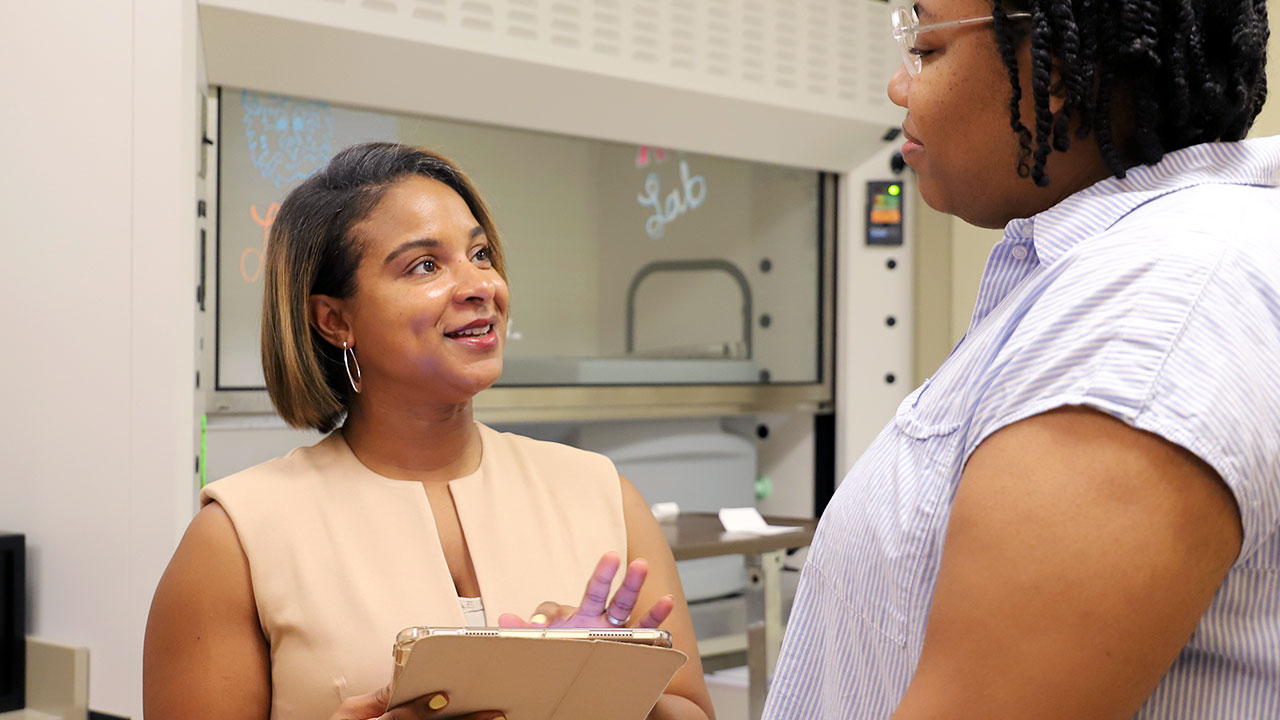content body

Evelyn Hunter (left), an associate professor in Auburn's College of Education, is pictured working in a lab. Hunter's Disrupt MS study is focused on those with MS in rural areas.
Auburn University College of Education professor Evelyn Hunter’s research is intended to cause disruption. After all, the word disrupt is literally in the name of her pioneering research study, which is focused on helping those with multiple sclerosis.
“We’re attempting to determine whether or not our social experiences or psychological health impact the levels of inflammatory markers,” said Hunter, an associate professor of counseling psychology in Auburn’s College of Education and a licensed psychologist who is leading the Disrupt MS study. “So, it helps us to more accurately pinpoint what types of experiences we might need to target in intervention so that we can disrupt the pathway to psychological distress and then perhaps limit the impact on the body.”
Just last year, Hunter’s Disrupt MS study was emboldened by an $850,000 philanthropic grant by the Bristol Myers Squibb Foundation to support research into health disparities in rural communities. Hunter said that while her study focuses on those with MS in rural areas, its findings also have the potential for even greater reach.
"Multiple sclerosis is what is considered a model chronic illness," Dr. Hunter explained. "We can use the knowledge that we gain from research with MS patients to apply to other types of illnesses."

Hunter said MS manifests differently in each individual, with symptoms ranging from vision issues to motor problems. Dr. Hunter's research focuses on how social experiences and psychological health influence inflammatory markers in MS patients. By pinpointing these influences, the study aims to develop interventions that can disrupt pathways to psychological distress, ultimately improving patient care. And the rural component of the work is important because she said MS patients in such locations face unique challenges.
"Our health is very much connected, and rural communities tend to have a lack of access to all of the things that make us healthier," Hunter said. "Managing a chronic illness like multiple sclerosis in rural communities can be more difficult than managing in urban environments or towns or cities that are more resource-intensive."
A second phase of the Disrupt MS study involves forming patient-provider coalitions, including psychologists, neurologists, and public health providers. This collaborative effort seeks to create psychological interventions tailored to MS care.
"We want providers to think about focusing on the whole person in MS care," Hunter said. "But we also want providers to be thinking about how we might apply the knowledge from this research to other forms of chronic illness, especially those forms of chronic illness where we see deep levels of disparities for different populations."
Hunter said her work aims to create good disruption, ultimately leading to a meaningful impact on healthcare.
"I get excited to think about the ways we might improve lives overall, and developing psychological interventions is something that can really improve the lives of individual patients,” she said. “And that’s exciting to be a part of.”




